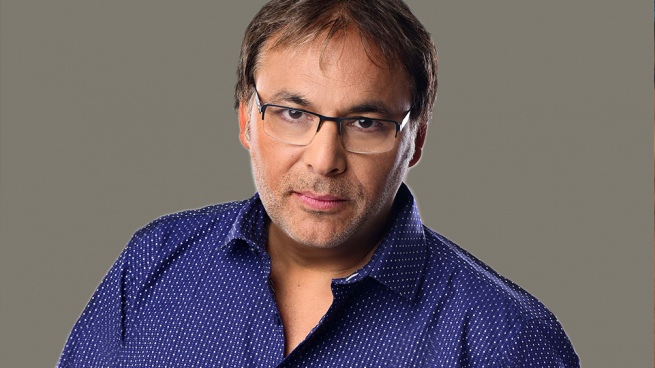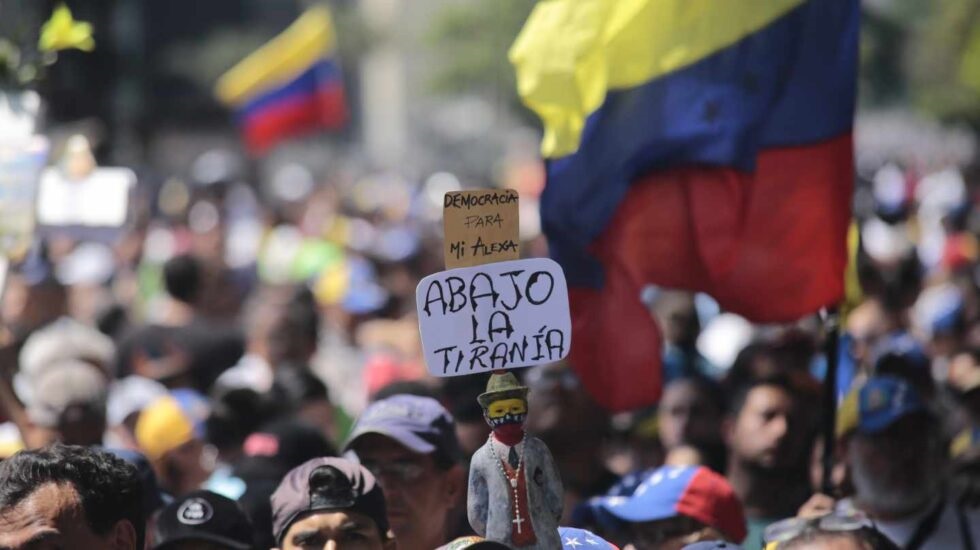With the excuse of interweaving the ideas of his latest books –“The duel“In his case and “Dad dear“, in hers- the writers and analysts Cynthia Willa and Gabriel Rolon starred in one of the most convening talks on Sunday in the book Fairin a meeting that discussed the unpredictable circuit of duels, the mistake of founding a relationship on the idea of completeness and the scope of love, which they agreed to define as “a wonderful deception”.
In an exchange moderated by journalist Luis Novaresio who did not avoid the ironies and the overacted Chicanas about the bond that unites Wyla and Rolón -who, in addition to having written four-handed texts, maintain a sentimental bond- the duo played the counterpoint of looks around death and desire, although in most cases they ended up giving feedback on their positions.
After reading fragments of the texts of both under the hypothesis that they talk secretly, Novaresio asked Rolón about the choice of the term “overshadowed” that the writer uses to define one of the stages of the trance that the protagonist of his novel “The Duel” goes through. The psychoanalyst quoted Freud when he described melancholy as a disease where “the shadow of the object falls on the ego” and passed to describe the way in which the absence of the loved one crystallizes in the thoughts of those who evoke it, “in a ghostly way, fatally present”. And he added: “That is something strange in human beings, which is to keep in mind what It’s gone, to be able to live with presences that are absences in themselves”.
Immediately, Rolón clarified that he was not only giving an account of an absence interposed by death: “How many times does one realize that a link, a relationship, had been gone for a long time.” And in parallel to a description of the duel he also offered an interpretation about the way in which falling in love operates in the construction of the other as a fiction, distant perhaps from reality, but ultimately the version that is longed for when a couple dissolves.
“We began to build in our psyche a image of the loved subject very own. I have Cynthia here next to me, but the Cynthia I have in my head is different. Now, if I lose her, in reality she will go (the one next to me) but the one who lives in me will not, “he said about the writer who is also his partner. And he closed: “I chose the term overshadowed because whoever goes through mourning is walking under the permanent existence of something that no longer exists”.
The talk turned to the need to go through mourning and not leave the loss fossilized. “A duel not put into words is an unresolved duel,” said the author of “Historias de diván” and “Los padecientes”, and connected his definition with what overwhelms María, the protagonist of “Dear Dad”, the novel by Wyla that narrates what happens to a woman when she receives a call from her mother, who informs her that her father, with whom she had cut off 20 years ago after a traumatic episode, is about to die in a clinic in Florida.
“Maria or any person who cannot process grief is in ruins. Grief is the active search for a place without debris, without ruins. So, when you lose something or someone you love, because we grow and in life we are constantly For this reason, the greatest challenge that a person has is to rebuild life at every moment, because at every moment we lose: dreams, illusions, things, desires, love… -he pointed out-. dreams that we built and that we have not been able to achieve”.
Rolón completed the idea of his table companion and went further: “In reality, we live in a deceitful world, we all live in the ruin of what our life has been -he postulated-. We are beings in permanent mourning”. The author of “Crosswords” clarified again that he was not referring strictly to death: “On the contrary, mourning is the fatal, unfair battle that someone gives, just so as not to die with what he has lost. Someone who assumes who has no choice but to walk a path and accept that there are going to be things that he will not have in order to recover the path of desire. Someone who has understood that after a loss he is never the same”.
Now: “Loves that hurt”, a chat with @LicenciadoRolon Y @CynthiaWila moderate @luisnovaresio Come to the José Hernández room in the red pavilion of the #FILBuenosAires! ? pic.twitter.com/QtTn0jFh9w
— Book Fair (@fairbook) May 1, 2022
“The duel returns us different: with something that we no longer have and with something that we did not have before losing. The wonderful thing is that with what we lose, something of us leaves also that journey leaves us a material, a clay with which we can model something you have with another life and with our desire, if we know how to listen,” Rolón said. “There are people who only go through mourning in a melancholy way, there are those who persist in childhood and childhood is no longer there, there are those who choose to stay in a bond or in a love that is no longer there”.
At that moment of massive and silent listening in the packed José Hernández room, one of the most powerful sections of the afternoon arrived: “Nobody hurts for you, nobody dies for you. Why is death so scary? Because we die totally alone, even if we are surrounded by 36 relatives. Death is lived alone, like orgasm. Even if we are making love with someone, the orgasm is mine, I’m sorry. Our life is alone, the rest is a deception. Love is a wonderful deception ” , he emphasized.
Wyla intervened to nuance the idea of a lie. “Love is an advantage. Your advantage is facing that knowing, putting it in parentheses. Love is always good news,” she said. Immediately, Novaresio intervened to mark the cheerful optimism of the author of works such as “Pasiones en Guerra” and “El Cuerpo Prohibido” over the darker look of her table companion. “I like Cynthia better,” said the journalist, to which Rolón limited: “Me too, how alive.”
“Who falls in love with a real person? Let’s be honest,” the author of “The Absent Voice” harangued. The lover builds the loved one to his liking and piacere. So, love is a wonderful trick, an advantage to go through a painful life. There is no possibility of the complement of another who fits with you, this idea of the better half. But love does have an advantage: for a while it holds you in an incompleteness that doesn’t hurt.. I get to the idea that love has to complete you, that you fell in love and you don’t need anything else, that you die without the other “.
“Lovers often say ‘I’ll die without you’. It’s dangerous to think that way, because if I die if you leave me, then it means I have to put up with anything. Who here hasn’t lost someone loved? I see them very much alive,” he stressed.
Wyla intervened to expand Rolón’s idea, with whom she co-wrote the play “El amor y las pasiones”, in addition to having performed on stages throughout the country with the piece “El side B del amor”. “This misunderstanding of language has to do with not being able to complete ourselves with the missing beings that we are. Love does not escape this, no emotion escapes this, not even pain,” she pointed out.
The conversation led to a new position on the nature of desire in couples. “I don’t understand couples who want to do everything, but everything, together, No! They will kill the desire he alerted. You always have to do something that you can’t, a ‘I wanted a little more’. And yes, that’s why we’re together. Because we are looking for that little bit more. It is essential to understand that as human beings we move in an unsatisfied world. Do you know who is the person you love? He is not the one who fulfilled all your fantasies, he gave you all the tastes and satisfied all your desires. He is the one who can keep your degree of dissatisfaction in a place that doesn’t hurt.”
Wyla adhered to the writer’s idea alleging the need to live in dissatisfaction. “There is a necessary dissatisfaction not to collapse, because precisely desire has to do with lack. One desires what one does not have,” he said. “We live in a demanding and successful life that proposes us to desire more. It seems to me that this involves the danger not to enjoy. It’s interesting to be able to buy a chocolate, but also to enjoy tasting that chocolate and then remember the taste of chocolate. The desire doesn’t have to end or disappear when it’s satisfied.”
“Freud said that the symptoms take on the modalities of the time. I think that what is symptomatic of this time is successism, keeping ourselves dissatisfied all the time. And although this is something constitutive, we have to fight and realize that when we have reached a dream we have to pause and stop to look and enjoy. Because yes, it turns very quickly. And when you turn the page of a book very quickly, there are things you don’t understand,” said the lawyer and writer.
Rolón broke down his perspective on the subject. “The desire is not going to disappear,” he indicated. desire begins to move, because sooner or later it will move, instead of jumping madly to any side, what love does is that this desire regulates itself”.
At the end, the psychoanalyst, at the request of Novaresio, explained his objection about hope. “Hope stops us. Desire pushes us to hold on to what we should be, but hope means waiting for what you want to happen from a place of helplessness.. There is a theory that says: ‘If you want something very much, you attract it’. Lie! Who came up with such stupidity? When you want something, it’s easier for it to happen, but not because you attract it, but because you go towards what you want,” he stressed. Shortly after, the exchange ended amid loud applause and the pair stayed for a long time chatting and being patient at the discussion session. photos with your readers.


















